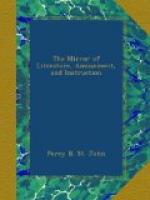heroine of a tale of chivalry. The anecdotes
which are told of this high-spirited lady in the three
counties of York, Westmoreland, and Cumberland, are
almost innumerable, and relate to circumstances in
her life, which, though some are impossible, and others
improbable, are still all full of heroic interest
and adventure. Her defence of Bromeham Castle
against the intrusion of her uncle of Cumberland,—her
riding cross-legged to meet the judges of assize,
when she acted in person at Appleby as High Sheriff
by inheritance of the county of Westmoreland,—her
hairbreadth escapes and dangers during the great rebellion,
are characteristics of the woman, so striking in themselves,
that they would require little adventitious ornament
from the writer, who should take them as incidents
for poem or romance. Her courage and liberality
in public life were only to be equalled by her order,
economy, and devotion in private. “She was,”
says Dr. Whitaker, “the oldest and most independent
courtier in the kingdom,” at the time of her
death.—“She had known and admired
queen Elizabeth;— she had refused what
she deemed an iniquitous award of king James,”
though urged to submit to it by her first husband,
the Earl of Dorset;— “She rebuilt
her dismantled castles in defiance of Cromwell, and
repelled with disdain the interposition of a profligate
minister under Charles the Second.” A woman
of such dauntless spirit and conduct would be a fitting
subject, even for the pencil of the mighty magician
of Abbotsford. A journal of her life in her own
hand-writing is still in existence at Appleby Castle.
I have heard, that it descends to the minutest details
about her habits and feelings, and that it is that
cause alone, which prevents its publication.
Blackwood’s Magazine.
* * * *
*
A VILLAGE FUNERAL IN THE SIXTEENTH CENTURY.
The sun was careering brightly in the heavens, and
all nature was rejoicing in its unclouded glory, as
the funeral procession of Helen Hartlington, and Antony
Clifford, wound its toilsome and melancholy way to
Bolton Abbey. The sportive Deer were bounding
lightly over the hills, and the glad birds were warbling
melodiously in the thickets, as if none but the living
were moving amongst them; and but for the wild dirge,
which mingled with the whispers of the wind, and but
for the deep-toned knell which ever and anon rose
slowly and mournfully above it, the lone traveller
would never have conjectured that Death was conveying
its victims through those smiling scenes. As
the procession approached the portals of the Abbey,
it was met, as was then customary, by the young men
and maidens of the surrounding villages, in their best
array, who hung upon the hearse chaplets of fragrant
flowers, and strewed its path with rosemary, pansies,
and rue. At the same moment the solemn chant of
the Miserere thrilled upon the soul, and was succeeded,
as it gradually melted into silence, by the still
more affecting strains of the parting requiem for
the dead—Ibid.




